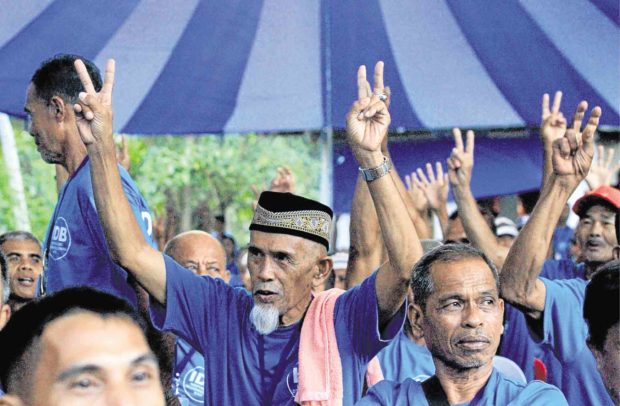
WELCOMING PEACE | Former fighters of the Moro Islamic Liberation Front flash the victory sign to symbolize peace during the decommissioning rites for members and weapons of the Bangsamoro Islamic Armed Forces in Maguindanao province. (RICHEL V. UMEL / INQUIRER MINDANAO)
KORONADAL CITY, South Cotabato, Philippines — Gains have been achieved so far in the Bangsamoro peace process, but independent observers noted that delays in some of its key areas could potentially get in the way to the attainment of sustainable peace.
According to the international Third Party Monitoring Team (TPMT), several dimensions of the peace process were still at an early implementation stage and that obstacles to realizing sustainable peace by 2025 remain and should not be underestimated.
“Peace is taking more time and we need to be patient,” Huseyin Oruc of Turkey said in a press briefing on Thursday during the release of the team’s 7th Public Report in Pasig City.
Oruc, a member of the TPMT, cited the team’s projections in 2013 that all the mechanisms for lasting peace in Bangsamoro would already be finished by 2016.
Unfulfilled expectations
“Now, we are targeting 2025. These are very long delays, this country deserves peace and we need the support of everyone…for the full implementation of the peace agreement,” he said.
The unfulfilled expectations include the proposed transformation of the six recognized camps of the Moro Islamic Liberation Front (MILF) into peaceful and productive economic zones.
TMPT chair Heino Marius said finalizing the Camps Transformation Plan and the Camps Transformation Investment Plan had only been agreed very recently.
“We would expect that the Bangsamoro Normalization Trust Fund (BNTF), which is now in place and which has been operationalized (last year), could also hopefully play an important role in working toward turning these camps into peaceful, productive communities,” he said.
Marius added that discussions about the BNTF could be found in documents many years back, but it was only last year that the fund was put in operation.
The six MILF enclaves recognized by both parties include camps Abubakar as-Sidique in Maguindanao, Bilal in Lanao del Norte and Lanao del Sur, Omar ibn al-Khattab in Maguindanao, Rajamuda in North Cotabato and Maguindanao, Badre in Maguindanao, and Busrah Somiorang in Lanao del Sur.
The BNTF was formally launched in May 2021 by the MILF-led Bangsamoro government, together with officials from the then Office of the Presidential Adviser on the Peace Process and the World Bank, chosen as fund administrator by the Philippine government and the MILF.
Steady progress
Last week, the TPMT, which was established in 2013 to monitor and review the implementation of the peace agreements between the Philippine government and the MILF, issued its 7th Public Report, covering the period from November 2020 to January 2022.
In a statement, the TPMT noted steady progress in advancing the peace process in the Bangsamoro Autonomous Region in Muslim Mindanao (BARMM), which was created in 2019 following the ratification of Republic Act No. 11054, or the Organic Law for the BARMM.
The key achievements during the reporting period included the adoption of two more priority codes (Civil Service Code and the Education Code), the transfer of Cotabato City into the BARMM administrative structure, regular interaction between the national and Bangsamoro governments through the Intergovernmental Relations Body (IGRB), the issuance of an amnesty proclamation (including for members of the MILF) and the launch of the third round of decommissioning of MILF forces, the TPMT said.
Marius also noted that the government and the MILF showed a high level of commitment to the peace process and the ceasefire agreement between the parties remained intact.
“We believe that this is the right time to look at the peace agreements from a broader perspective, to assess what has been achieved and what remains to be done, also in view of the new administration taking over later this year,” Marius said.
—WITH A REPORT FROM JULIE ALIPALA
RELATED STORIES
Bangsamoro welcomes term extension of BTA nominees
Bangsamoro chief to military: It’s not terrorists’ haven but MILF territory
EU to give P605.4 million for peace initiatives in Bangsamoro

